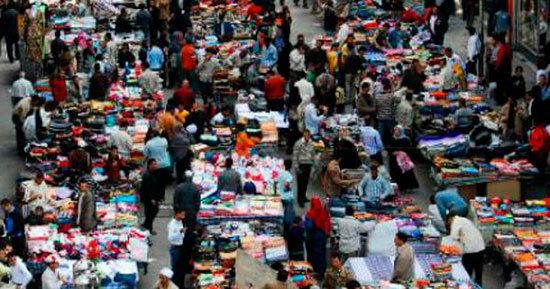Informal Economy and Examples

Contents
The informal economy is one where labor conditions do not follow a legal framework. Thus, it encompasses a range of productive activities where workers lack rights such as paid vacation, compensation for time served, severance pay, and other benefits.
In other words, this type of economy includes all businesses where informal employment exists, meaning people work outside the framework of labor laws.
An important aspect of the informal economy is that, unlike the formal sector, it does not pay the required taxes. For this reason, many businesses prefer to remain in the informal sector to reduce their costs.
Informality is often linked to low productivity levels, a lack of legal knowledge (business owners who are unaware of the law), and low investment in technology. Likewise, it is often associated with poverty and marginalization, but this is not always the case. For example, in a perfectly formal business, an employer might decide to conceal the overtime hours their employees work to avoid paying for that additional time. These unrecognized man-hours are part of the informal economy.
Another point to consider is that highly unequal labor relationships can arise within this economy. As mentioned in the previous paragraph, overtime may go unrecognized. Similarly, there can be unjustified or arbitrary dismissals, or even non-payment of wages.
Definitions of the Informal Economy:
- The informal economy is an income-generating process characterized by its avoidance of regulations set by societal institutions.
- Informality is comprised of all economic activities that are not compliant with government regulations.
- The informal economy includes production units operated by an individual or household that are not incorporated as a legal entity separate from their owners and are also characterized by low capital and productivity.
- Informal activities are economic activities that are not included in national accounts or official statistics.
Other Definitions of the Informal Economy
- From a productivity perspective: A worker is considered informal if they are self-employed but not a technical or professional worker, or if they are a worker with no income or insufficient wages.
- From a legal perspective: Workers who, despite being salaried, do not have the right to a retirement pension linked to their employment.
Origin of the Term “Informal Economy”
The term emerged in the 1970s in a report by the International Labour Organization (ILO) on the labor market in Kenya. It was used to highlight the fact that in poor countries, labor market problems were not centered on unemployment, but rather on the large number of workers employed in jobs with very low productivity who earned insufficient incomes.
Informal Sector or Informal Economy?
In academic circles, the term “informal sector” is distinct from “informal economy.” This is because the expression “informal sector” is considered inadequate to reflect all aspects of the phenomenon, as informality does not occur in just one sector, economic activity, or industrial group. The term “informal economy,” on the other hand, refers to a more diverse group of workers and businesses across all sectors, in both urban and rural areas, who engage in informal survival activities.
Informal Economy and Legality
Informality does not imply illegality. In the informal economy, economic agents interact with the state in some dimensions but not in others, creating a gray area between the extremes of full legal compliance and non-compliance.
Main Characteristics of the Informal Economy
The concept of the informal economy can be summarized by several key characteristics:
- More predominant in poor countries.
- Evasion of legal regulations.
- Tax evasion.
- Can be illegal if it involves unauthorized activities.
- Unfairly competitive due to its evasion of taxes.
- Unprotected workers.
- More common in urban areas than in rural areas.
- Inferior working conditions.
- Common among small companies but less so among large ones.
Difference between the Informal Economy and the Underground Economy
The informal economy is a part of the underground economy (also known as the shadow economy). The latter generally includes all “black money” in a market or country—that is, all transactions that are not declared to the authorities.
The underground economy encompasses both the illegal economy, which includes explicitly prohibited activities, and those activities that, while legal, are not declared. This latter category is known as the informal economy.
In other words, illegal drug trafficking is part of the underground economy, but not the informal economy.
Examples of the Informal Economy
Some examples of occupations that can fall within this economy include:
- Independent Workers/Freelancers: For example, some individuals may provide private tutoring but do not declare this activity to tax authorities.
- Domestic Workers: In many countries, their work is not covered by a legal framework that defines, for example, their benefits and working hours.
- Street Vendors: Merchants who occupy public spaces, sometimes on an itinerant basis, to sell their products.
- Car attendants/watchers.
- Shoeshiners.
- People who work from their own home or workshop.
- Apprentices or unpaid family members in a business.
- Workers in the formal economy but without social security.
Causes of the Informal Economy
There are two schools of thought that explain the causes of the informal economy differently.
One asserts that informality is a consequence of a lack of development and insufficient protections for workers. This survival-based perspective, for example, explains informality as the result of pressure from surplus labor on the job market amid a shortage of positions in the formal sector. Because people lack unemployment insurance, they seek their own solutions by selling goods or providing services to survive.
The other school of thought argues that informal activities are actually the result of bad governance: excessive regulation, deficient government services, or a combination of both. There are costs to formality and incentives for informality created by various public policies or actions that lead workers and businesses to opt for varying degrees of informality.
Finally, others believe the causes are a synthesis of the ideas from each school of thought. In this view, informality arises from both a lack of economic development and deficient governance.
Problems of the Informal Economy
Why is the informal economy considered a problem for the economy? The problems include:
- Companies and workers have low productivity.
- Workers and families are unprotected from adverse shocks.
- Unfair competition for companies that pay taxes and comply with regulations.
- Tax evasion, which affects the public budget.
- Negative impacts on public institutions and the rule of law.
- Generation of poverty and a slowdown in economic growth.
- A waste of productive factors like capital and labor.
Implications or Consequences of the Informal Economy
According to Hernando de Soto, the informal economy plays a significant role in economic development. In his book “The Other Path,” he argues how this phenomenon is key to realizing the aspirations of the poorest for robust and equitable economic growth. He believes that if governments eliminated many bureaucratic regulations, the activity and creativity of entrepreneurs would increase.
Related: A Guide to the Orange Economy: Creativity and Culture
Additionally, workers in the informal economy are excluded from most public policies and programs for education, vocational training, access to credit and technology, etc. Because of this, they are at a disadvantage and face greater difficulties than other workers in increasing their income and quality of life.
Conclusion on the Informal Economy
The study of informality is very difficult due to the complexity and magnitude of the phenomenon. The informal economy spans many economic sectors and fields of study, such as the labor market, poverty, economic growth, law, and institutional frameworks.
Likewise, the informal economy is a serious problem in poor countries. In Latin America and the Caribbean, it is a very common phenomenon that leaves large segments of society unprotected and left behind. Furthermore, the negative consequences of informality are numerous and affect economic development and, ultimately, the quality of life for people in the region.










